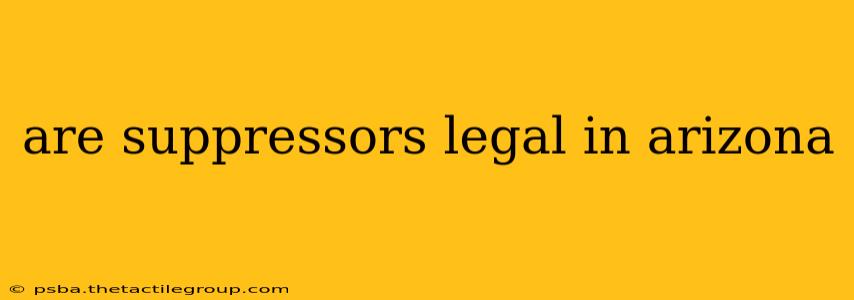The legality of firearm suppressors, often called silencers, in Arizona can be a bit confusing, but this guide will clarify the process and regulations. The short answer is: yes, suppressors are legal in Arizona, but with strict regulations. This means understanding the laws is crucial before purchasing or possessing one.
Arizona's Suppressor Laws: Key Points
Arizona follows federal law regarding the possession and use of firearm suppressors. This means you'll need to navigate both state and federal regulations to ensure compliance. Here's a breakdown:
Federal Regulations: The National Firearms Act (NFA)
The National Firearms Act (NFA) of 1934 governs the manufacture, sale, and possession of suppressors. Key aspects include:
- Registration: Suppressors are considered NFA items, requiring registration with the Bureau of Alcohol, Tobacco, Firearms and Explosives (ATF). This involves a thorough background check and a significant waiting period.
- Tax Stamp: A $200 tax stamp is required for each suppressor registered.
- Transfer Process: Transferring ownership of a suppressor also requires ATF approval and adherence to specific procedures.
Arizona State Laws: Adding to the Complexity
While Arizona doesn't prohibit suppressors outright, state laws further define their usage:
- Permits and Licenses: Arizona doesn't have specific state-level permitting requirements for suppressors beyond the federal NFA regulations. However, you must still comply with all federal laws and processes.
- Transportation: Transportation of suppressors must adhere to federal regulations and any additional state laws concerning firearm transport.
- Use Restrictions: Certain locations, such as schools or other restricted areas, may prohibit the use of suppressors even if legally possessed. Always check local ordinances.
The Process of Legally Obtaining a Suppressor in Arizona
- Background Check: You must pass a rigorous background check through the ATF.
- Application and Tax Stamp: Submit the necessary ATF paperwork (Form 4) and pay the $200 tax stamp.
- Waiting Period: Expect a significant waiting period (often several months) for ATF approval.
- Dealer Involvement: Purchase the suppressor from a licensed firearms dealer who is familiar with NFA regulations. They will handle much of the paperwork.
- Storage and Transport: Ensure you store and transport your suppressor according to both federal and state laws. Keep it properly registered and secured.
Common Misconceptions about Suppressors in Arizona
- Complete Silence: Suppressors significantly reduce the sound of a gunshot, but they do not make firearms completely silent.
- Automatic Approval: The ATF approval process is lengthy and requires meticulous attention to detail. Be prepared for delays.
- Unrestricted Use: Even with legal possession, use may be restricted in certain places.
Conclusion: Navigating the Legal Landscape
Owning a suppressor in Arizona requires understanding and adhering to both federal and state laws. The process involves a thorough background check, paperwork, and a waiting period. Always consult with a licensed firearms dealer and legal professional specializing in NFA items to ensure compliance. Failure to comply with these regulations can lead to serious legal penalties.

